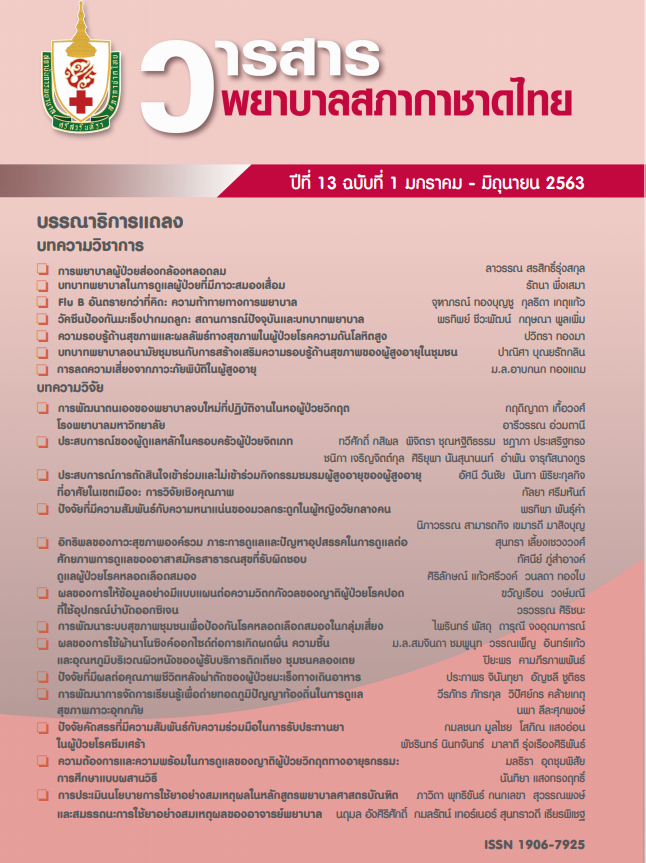Experiences of Determining Participation in Elderly Club Activities of Older People Living in Urban Areas: A Qualitative Study
Keywords:
factors, determining participation, elder club, older peopleAbstract
This phenomenological research aimed to explore the experience of determining participation in elderly club activities of older people living in the urban areas. The participants were 30 older people, both members and non-members of the elderly clubs living in Phitsanulok in 2018. Data were collected by using in-depth interviews. Data were analyzed by using the Giogi’s method.
The results of the study showed that factors of determining participation in the activities could be categorized into 2 main factors: 1) persuasion of others including friends, health care providers, and family members, and 2) perceptions that it would be useful for themselves such as gaining knowledge for self-care, making friends, and having fun. Reasons of choosing not to participate in activities could be categorized into 2 main factors: 1) having responsibilities or routine work to do or taking care of family members, and 2) services from the club did not meet their needs, such as incomprehensive public relations, not providing a shuttle bus for members, and limited types of activities.
The researchers have the following suggestions: 1) encourage elders and families to realize the importance of participating in social activities, 2) expand the area for activities of the club, and 3) increase the variety of activities, public relations channels, and facilitation of the shuttle bus for those who want to participate.
References
2. Foundation for Older Persons’ Development. Aging situation in Thailand [Internet]. 2016. [cited 2018 Dec 6]. Available from http://fopdev.or.th/ (in Thai)
3. National Statistical Office. Report on the 2007 survey of the older persons in Thailand provinces [Internet]. 2007. [cited 2018 Dec 6]. Available from http://service.nso.go.th/nso/nsopublish/service/survey/rep_older50.pdf (in Thai)
4. Laksananan T, Ittidechpong S, editions. Aging self-care [Internet]. 2015 [cited 2018 Dec 6]. Available from http://knowledgemanagement.anamai.moph.go.th/download/BOOK/AgingSelfcare.pdf. (in Thai)
5. Amagasa S, Fukushima N, Kikuchi H, Oka K, Takamiya T, Odagiri Y, et al. Types of social participation and psychological distress in Japanese older adults: A five-year cohort study. PLoS ONE 2017;12(4):e0175392.
6. Mahanupap Health Center. Registry of members of elder club at Mahanupap Health Center. Phitsanulok: Mahanupap Health Center; 2017. (in Thai)
7. Goll JC, Charlesworth G, Scior K, Stott J. Barriers to social participation among lonely older adults: The influence of social fears and identity. PLoS One 2015;10(2):e0116664. doi: 10.1371/journal.pone.0116664.
8. Chanawongse K, Isarangura Na Ayudhya V, Dansawadikul T. The study of factors affecting sustainability and continuity of the elderly health promotion club, the 7th Khon Kaen Health Center, Muang district, Khon Kaen province. College of Asian Scholars Journal 2016;6(1):136-41. (in Thai)
9. Aewsriwong N. Urban in new Thai society. (n.d.) [cited 2019 Aug 14]. Available from http://www.human.cmu.ac.th/courseonline/huge/050103/pdf/moung1.pdf (in Thai)
10. Prasertpan C, Piaseu N, Maruo SJ, Kittipimpanon K. Activities and outputs of a Senior Clubinan Urban Community: a case study. Rama Nurs J 2014;20(3):388-400. (in Thai)
11. Adams KB, Leibbrandt S, Moon HA. critical review of the literature on social and leisure activity and wellbeing in later life. Ageing & Society 2011;31(4):683-712.
12. Plodpluang U. Data analysis in phenomenology studies. Nursing Journal of the Ministry of Public Health 2013;23(2):1-10. (in Thai).
13. Hatch J A. Doing Qualitative Research in Education Setting. New York: State University New York Press; 2002
14. Kang HW, Park M, Wallace JP. The impact of perceived social support, loneliness, and physical activity on quality of life in South Korean older adults. J Sport Health Sci 2018;7(2):237-44.
15. Senior Citizen of Thailand. Working together for aging care in communities [Internet]. 2017 [cited 2018 Dec 6]. Available from http://resource.thaihealth.or.th/system/files/documents/lo_book_old_boy_inside_07
2516.pdf. (in Thai)
16. Rejeski WJ, Fanning J. Models and theories of health behavior and clinical interventions in aging: a contemporary, integrative approach. Clin Interven Aging 2019;14:1007-19.
17. Khadsuk B. Comparison of data collecting from questionnaire and dialogue in studying the participation of committee of the senior citizens clubs in Bangkok Metropolitan [dissertation]. Bangkok: Thammasat University; 2010. (in Thai)
18. Tanner J. Aging and role loss [Internet]. 2010 [cited 2019 Aug 14]. Available from https://www.brainybehavior.com/blog/2010/11/aging-and-role-loss/
19. Viwatpanich K. Situation and direction of research-thesis in elder club in Thailand. Thammasat Medical Journal 2012;12(2):331-7. (in Thai)
20. Pongcharee P. The development of aging union activities: A case study of Nadoon Sub-district, Nadoon District, Mahasarakham Province.J Grad MCU Khonkaen Campus 2016;3(1):68-77. (in Thai)
21. Udplong A., Rojkureesateian K., Vong-Ek P. Factors driving the elderly club’s activities: A case study of Ban Mae La Mao elderly club, Pha Wor Subdistrict, Mae Sot District, Tak Province. Journal of Public Health 2013; 43(1):68-79. (in Thai)
22. World Health Organization. Global age-friendly cities: a guide [Internet]. 2007 [cited 2019 Aug 14]. Available from: http://www.who.int/ageing/age_friendly_cities_guide/en/
23. Mongphet C. Welfare needs that promote vocational self-reliance of the group of the elderly persons who are former employees of Metropolitan Administration. [dissertation]. Bangkok: Thammasat University; 2009. (in Thai)
Downloads
Published
Issue
Section
License
เนื้อหาบทความหรือข้อคิดเห็นต่างๆ ในวารสารพยาบาลสภากาชาดไทยนี้ เป็นความคิดเห็นของผู้เขียนบทความ ไม่ใช่ความเห็นของกองบรรณาธิการ หรือสถาบันการพยาบาลศรีสวรินทิรา สภากาชาดไทย






